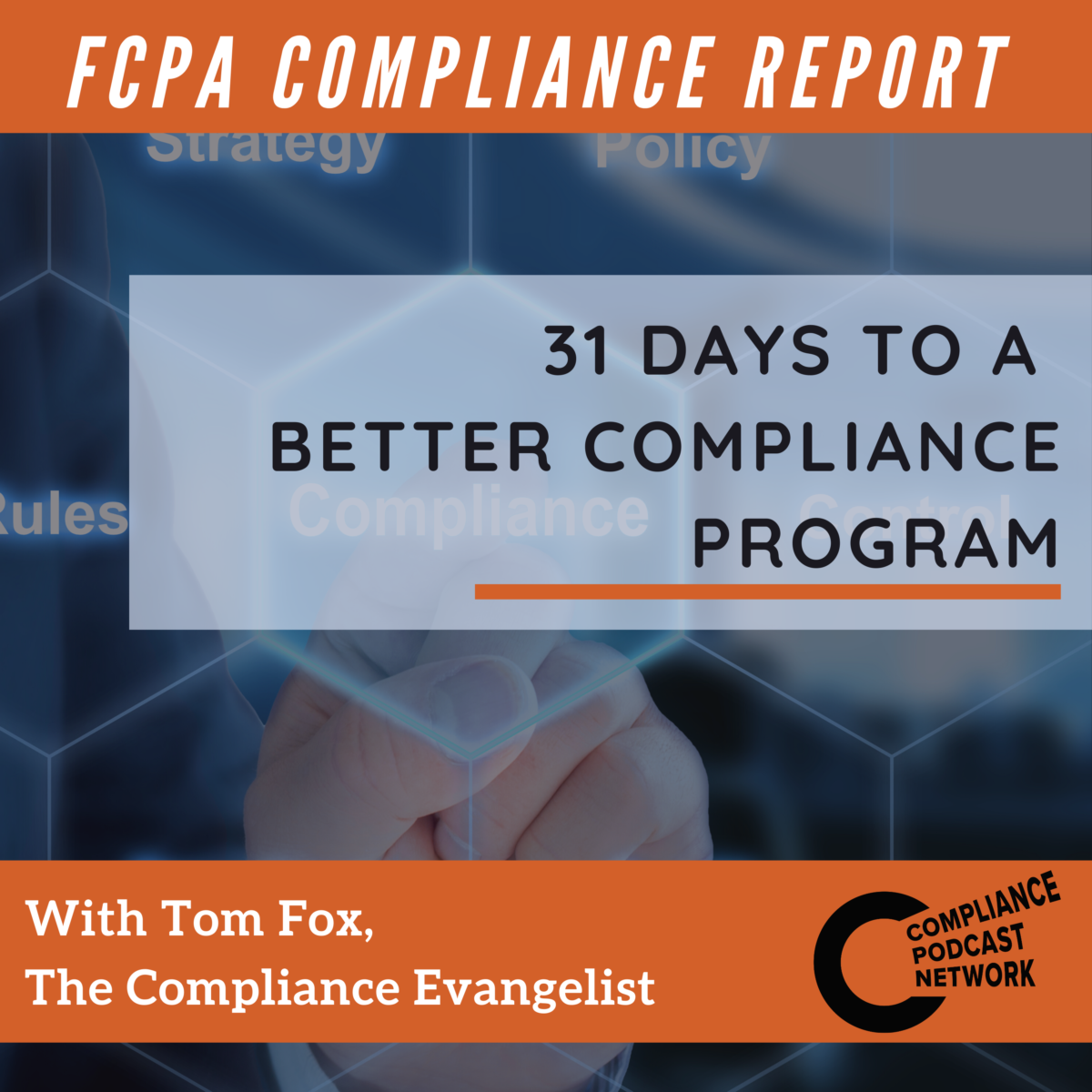Last week saw the announcement of two significant and related releases of information from the Department of Justice (DOJ) around Foreign Corrupt Practices Act (FCPA) enforcement and corporate compliance programs. They were the Monaco Memo and a Speech by Assistant Attorney General Kenneth A. Polite made at the University of Texas Law School. Every compliance professional should study them both.
Over the next several days, I will be blogging about each of them and other DOJ announcements. I will also have a series of podcasts about different aspects of the releases with a variety of guests including Affiliated Monitors, Inc. (AMI) founder Vin DiCianni, Morrison & Foerster LLP (MoFo) partner James Koukios and my Compliance into the Weeds co-host, Matt Kelly. The Memo is broken down into four main sections: I. Guidance on Individual Accountability; II. Guidance on Corporate Accountability; III. Independent Compliance Monitorships; and IV. Commitment to Transparency in Corporate Criminal Enforcement. Today I want to introduce each release and try to place it into the overall context of DOJ communications to the compliance community, compliance professionals and Chief Compliance Officers (CCOs).
The Monaco Memo builds on many of the topics first articulated by Deputy Attorney General (DAG) Lisa Monaco last October in a speech to the ABA White Collar Bar conference. Koukios said he had two major reactions to the Monaco Memo. First, “I think it’s great when the department puts out a Memo like this, that lays out very clearly.” It sets out the DOJ expectations which Koukios believes the DOJ strives to do for the corporate compliance professional and the white-collar defense bar, which they have done so in an iterative matter. From releases of documents such as the Phillips Memo, to the FCPA Corporate Enforcement Policy to the Evaluation of Corporate Compliance Program and its Update. He added, “I think this is another one of those really helpful memos that sets out the factors that the DOJ will consider.”
He sees the Monaco Memo going further by delineating the implications of the factors it sets out. He went on to note, “I think that there is a lot more in this Memo than there have been in some other, more recent memos.” Moreover, it lays out multiple changes at both “a high level and at the more granular level as well.” Koukios concluded, “I think it’s a very impactful Memo that practitioners’ compliance officers and other people dealing with this space really should spend time reading and understanding.”
I visited with DiCianni on the Independent Compliance Monitorships component. DiCianni believes the Monaco Memo is both further clarification and further guidance for line prosecutors when they are considering whether or not to put a monitor in place. Echoing Koukios in this section of the Memo, he noted that it lays out both broad goals and guidelines and then drills down into specific requirements in a way “we’ve never seen before.” Further, while many of the factors “are really quite interesting there are not really anything new and from the monitors perspectives.” And while we have seen these factors in a disparate manner, in disparate places, “here they are in writing.” Once again this echoed something Koukios told me, that perhaps the greatest significance is that the Memo sets down all of these matters in writing which leads to a blueprint for DOJ thinking and a roadmap for anyone who finds themselves in an FCPA investigation or enforcement action.
I see the Monaco Memo and the Speech as complimentary releases which drive home several key changes in DOJ enforcement. Perhaps changes is too strong, but they these announcements make clear the DOJ is dedicated to individual accountability and prosecution. Corporations will have to reorient their approach to investigations and sharing of information with the DOJ to this new approach. Next the DOJ is strongly shifting the burden in the investigatory and negotiation phases to make clear the company must come forward with evidence to support lower fines and penalties and greater discounts, particularly in the area of individual financial penalties and incentives, i.e., clawbacks. Finally, the Monaco Memo lays out not simply how to avoid a monitor but a program of proactive monitoring which can lead to the prevention of a crime before the FCPA is violation.
The Memo itself said that the DOJ had established the Corporate Crime Advisory Group (“CCAG”) to evaluate and recommend further guidance and consideration after the Monaco Speech from October 2021. This CCAG included leaders and experienced prosecutors from “components of the Department that handle corporate criminal matters: the Criminal Division; the Antitrust Division; the Executive Office of United States” to both evaluate and provide “revisions and reforms to enhance our approach to corporate crime, provide additional clarity on what constitutes cooperation by a corporation, and strengthen the tools our attorneys have to prosecute responsible individuals and companies.”
The DOJ review considered input from “a broad cross-section of individuals and entities with relevant expertise and representing diverse perspectives, including public interest groups, consumer advocacy organizations, experts in corporate ethics and compliance, representatives from the academic community, audit committee members, in-house attorneys, and individuals who previously served as corporate monitors, as well as members of the business community and defense bar.”
The Memo itself is designed to “promote consistency across the Department” by applying it Department-wide. Some announcements establish the first-ever DOJ-wide policies on certain areas of corporate crime, “such as guidance on evaluating a corporation’s compensation plans; others supplement and clarify existing guidance. The policies set forth in this Memorandum, as well as additional guidance on subjects like cooperation, will be incorporated into the Justice Manual through forthcoming revisions, including new sections on independent corporate monitors.”
I hope you will join me tomorrow where I look at individual accountability and internal investigations.




